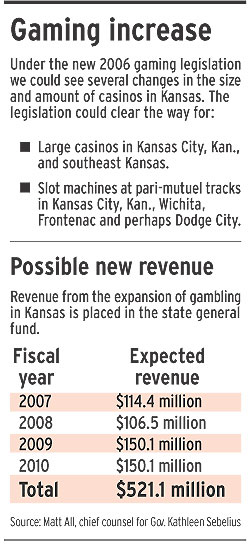Lawmakers gamble with casino bill
Topeka ? In a high-stakes gamble, Senate leaders dealt a new casino bill Tuesday but were unsure whether it would be a winner.
“We’re close,” said Senate President Steve Morris, R-Hugoton.
The measure introduced in the Senate Federal and State Affairs Committee would produce more than $500 million over four years for the state – from new casinos in Kansas City, Kan., and southeast Kansas, and from 7,000 slot machines at tracks in Kansas City, Kan., Frontenac, Wichita and possibly Dodge City.
Some lawmakers are eyeing expansion of gambling opportunities to pay for court-ordered school finance increases. Legislative school spending plans so far have ranged from $500 million to $660 million over the next three years.
But if first impressions are any indication, the gambling proposal may be in for a rough ride.
Several legislators walked out of the committee after the measure was laid out. They said a scheduled Thursday hearing on the plan didn’t give them enough time to prepare.
“I don’t appreciate the abuse of the process,” Sen. Kay O’Connor, R-Olathe, said as she left the meeting. Sens. Karin Brownlee, R-Olathe, and Ralph Ostmeyer, R-Grinnell, followed her.

But Chairman Pete Brungardt, R-Salina, said the legislation was similar to proposals that had been debated for the last three years. “I don’t think it’s a blindslide,” he said.
Matt All, chief counsel for Gov. Kathleen Sebelius, said the measure could produce $521 million for state coffers over the next four years, in addition to pumping in $173.7 million for local governments that could be used for property tax relief.
“I believe these assumptions are reasonable,” All said, although, he added, “All of this depends on the quality of the facilities.”
Former Senate Majority Leader Lana Oleen, now a lobbyist for American Indian gambling interests, wasn’t impressed, however.
“A disgusting bill raises its head in the Senate,” she said. Indian nations, which already operate casinos in northeast Kansas, have proposed revenue-sharing compacts with the state.
Lawrence senators Roger Pine, a Republican, and Marci Francisco, a Democrat, were noncommittal. Both voted against expanded casino gambling last year.
“I’m re-evaluating, but I haven’t reached a decision yet,” Pine said.
Francisco said she wanted to analyze the differences in the new proposal from a 2003 study authorized by the governor’s office.
“Are we doing what the gaming task force said, and if not, why not?” she said.
Legislators acknowledged that lobbying was getting intense to find the 21 votes needed in the 40-member Senate to gain approval.
Morris said the Senate probably would vote on the measure next week. He said school finance proposals made the state’s budget picture “problematic.”
“Ultimately, we will have to have another revenue stream,” he said.







